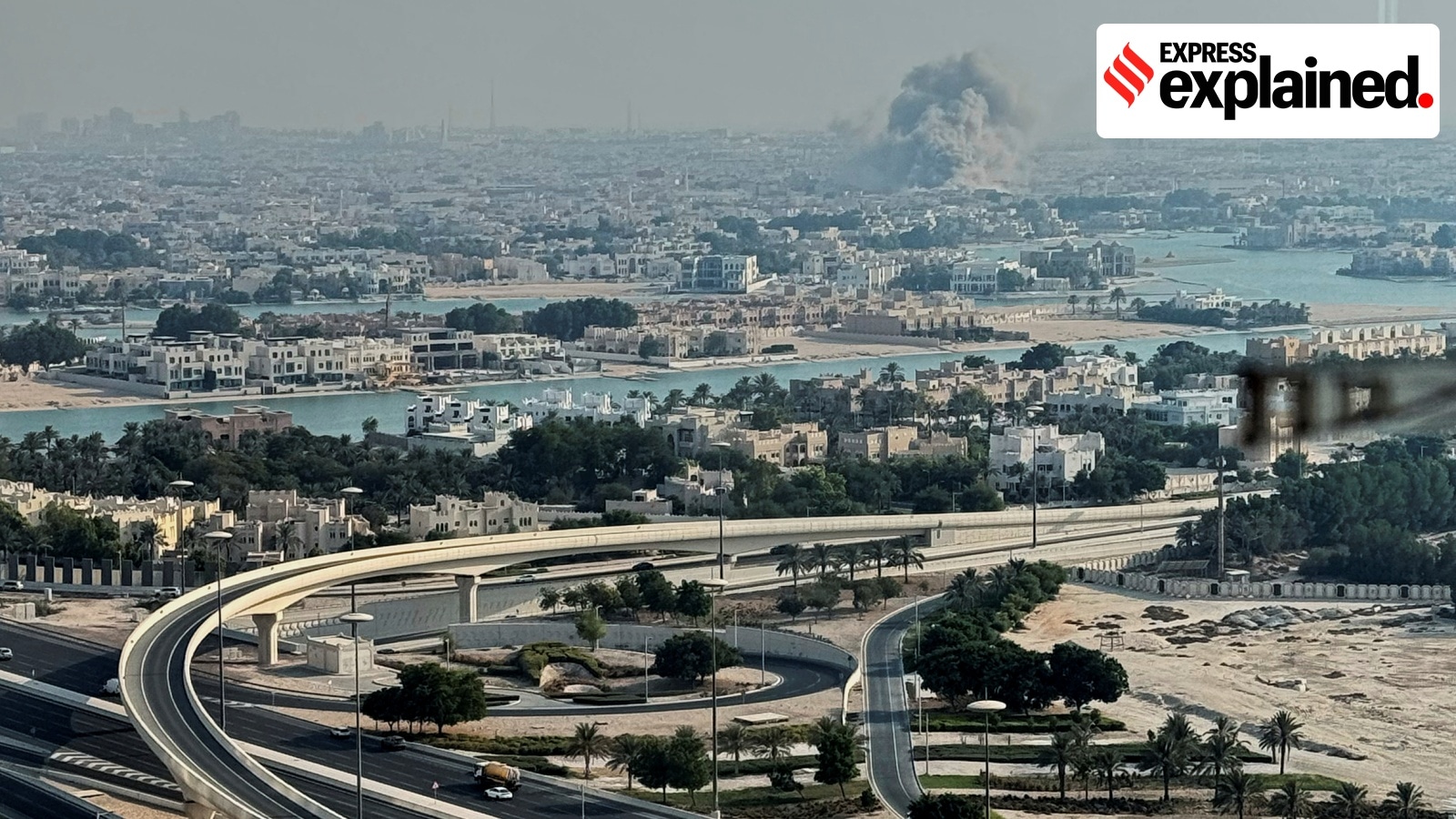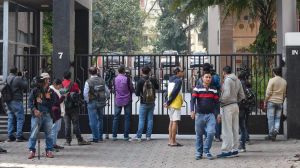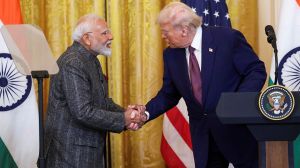Israel’s attack on Doha: why it was carried out, possible fallout
Netanyahu’s motivations go beyond just the continuation of operations against Hamas. Qatar, a US ally with a reputation for being a mediator in conflicts, will be looking at the Israeli action with a wider lens
 Smoke rises from the target of the Israeli airstrike on Doha on Tuesday. On Wednesday evening, Prime Minister Narendra Modi expressed “deep concern” and “condemn[ed] the violation of the sovereignty of the brotherly State of Qatar”. (AP)
Smoke rises from the target of the Israeli airstrike on Doha on Tuesday. On Wednesday evening, Prime Minister Narendra Modi expressed “deep concern” and “condemn[ed] the violation of the sovereignty of the brotherly State of Qatar”. (AP)Israeli jets struck a target in Doha on Tuesday, making Qatar the seventh country Israel has bombed since October 2023.
In a public statement, Israel said it had targeted a Hamas delegation that Qatar was hosting as part of ongoing negotiations with Israel and the United States.
At the time of the attack, Hamas leaders were meeting to discuss their response to the latest ceasefire proposal from Washington. The strike killed five Hamas members and a member of Qatar’s internal security, but reportedly failed to kill Hamas’ core negotiating team.
“If we didn’t get them this time, we’ll get them the next time,” Yechiel Leiter, Israel’s ambassador to the US, told Fox News on Tuesday.
This is the first time that Israel has attacked a Gulf Arab state directly, and one that is a US ally and hosts the largest American military base in the Middle East (Al-Udeid).
Israel’s calculation
Prime Minister Benjamin Netanyahu justified the airstrike as retaliation for a shooting in Jerusalem on September 8, and as part of Israel’s operation to eliminate Hamas after the terrorist attacks of October 7, 2023.
However, the targets, location, and timing of the strike, and the risk involved in the unprecedented attack on a US ally, point to a larger Israeli rationale.
Israel has been violently disrupting US negotiations with third parties that it is hostile to, by targeting the negotiators.
It attacked Iran in June — when the US was in the midst of nuclear negotiations with the Tehran regime — and rationalised the attack as strengthening the American bargaining position by weakening Iran’s. US-Iran negotiations are yet to resume.
After the Doha attack — for which Israel took “full responsibility” — Netanyahu informed President Donald Trump that Israel sought peace, and that the attack would help achieve that aim. Trump said Israel’s attack did “not advance Israel or America’s goals”, but eliminating Hamas was “a worthy objective”.
Like in the case of Iran, here too the Trump Administration regretted Israel’s actions and asserted US non-involvement, but retroactively deemed them acceptable.
The Doha strike also confirms Netanyahu’s strong disinclination for a ceasefire in Gaza, even one imposed by the US. An acceptance by Hamas of the US proposal this week would in theory enable a second ceasefire this year.
The first three-phase ceasefire sealed in January was breached by Israel in March after it alleged Hamas had deviated from the terms of the agreement, and launched a fresh offensive to take over larger parts of the Gaza Strip.
Tuesday’s attack in Doha came three days after Israel launched an operation to take over Gaza City, one of the last remaining urban areas in the South of the enclave where more than a million famine-stricken Palestinians have been forced to seek refuge following earlier Israeli orders to evacuate the North.
This tactic goes together with Israel’s strategy of taking over the remaining Palestinian territories. Any break in the military effort will create space for greater global pressure to halt such expansion — and Israel has no assurance that it will get such an opportunity again.
In May, Netanyahu had asserted that the war in Gaza would continue even if the hostages were released, since Israel’s goal was the complete elimination of Hamas. In the last week of August, more than 15,000 Israelis protested in the streets against the Prime Minister’s approach towards the release of the hostages. Netanyahu, though, seems to have assessed that the benefits from a disruption in ceasefire negotiations outweigh the risks of attacking a US ally in the Gulf.
Qatar’s perspective
The Prime Minister of Qatar described the unprecedented violation of Qatari sovereignty as “state terrorism”, and asserted that a “pivotal moment” had been reached, which required “a response from the entire region to such barbaric actions”.
Qatar, he said, was “a mediator state officially hosting negotiations and delegations from the state which launched missiles at the negotiating delegation from the other side”, and demanded to know how the Israeli action could be acceptable.
Qatar’s focus on its mediating role is important — Prime Minister Sheikh Mohammed bin Abdulrahman Al-Thani had met with the Hamas delegation the day before the Israeli attack to press for a ceasefire.
Qatar hosts the Hamas leadership not only out of its desire to be a successful regional mediator, but also at the behest of Israel and the US. The first Trump administration had used Qatar’s good offices to negotiate with the Taliban the US withdrawal from Afghanistan.
More than disrupting the negotiations for a ceasefire in Gaza, the Israeli airstrike undermines Qatar’s longstanding reputation as a secure and discreet facilitator of difficult and sensitive negotiations. This reputation has been key to Qatar’s international buy-in as Doha has risked its ties with other Gulf Arab states in the past to maintain critical relationships across regional faultlines (such as the Iranian government, the Muslim Brotherhood in Egypt, or Hamas in Gaza).
How does the Israeli airstrike differ from Iran’s attack on the Al-Udeid base in June?
Iran’s attack was symbolic retaliation for the US-Israeli strikes, to preserve the credibility of Tehran’s deterrence, and carried out with sufficient advance warning. There was also tacit recognition that the Iranian missiles would be intercepted before they hit Al-Udeid — and Qatar’s interceptions were successful.
Iran had also issued repeated assurances that it did not intend to cause damage to the “brotherly State of Qatar”.
Israel’s attack, on the other hand, was substantive, with declared intention to cause damage to Qatari facilities hosting the Hamas delegation. Advance warnings would be counter-productive to such an offensive mission. Iran avoided risk, while Israel absorbed it.
Fallout in the region
Qatar has “reserved its right to respond” to Israel’s attacks. Most Arab and other states have condemned the Israeli action, and Saudi Arabia has pledged to place “all capabilities” at Qatar’s disposal to respond to the “brutal Israeli aggression”.
But the scale of any Qatari response, if it occurs at all, will be limited or symbolic. Qatar is well integrated into the US military system in the Middle East, and has invested considerable resources in cultivating greater confidence within the Trump Administration (such as gifting the President a Boeing 747).
However, Israel’s confidence and capabilities to undertake such an attack would reinforce the two-year-old learning for Qatar and other regional Arab states that Israel now has disproportionate power and agency to unilaterally reshape the region.
On Wednesday, the Knesset Speaker posted an image of the Doha strike on X and announced that “this is a message to all of the Middle East”. For Gulf Arab states that spent the last decade balancing against Iran, which too, held disproportionate influence through its proxy networks, Israel would now appear as the power that needs counterbalancing.
The assault on Gaza has drawn global condemnation, and more states are increasingly displaying a willingness to also sanction and censure Israel, the latest being Spain. Blocs such as the European Union have usually tended to see sanctions as disturbing the route to a mediated solution. But the attack in Doha could have implications beyond the question of Qatari or Arab retaliation.
Bashir Ali Abbas is a Senior Research Associate at the Council for Strategic and Defense Research, New Delhi
- 01
- 02
- 03
- 04
- 05






































